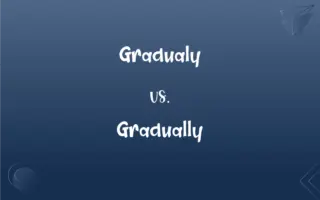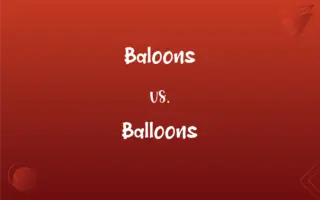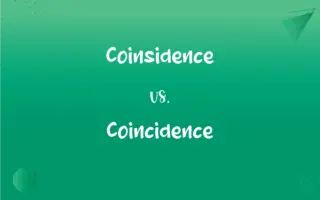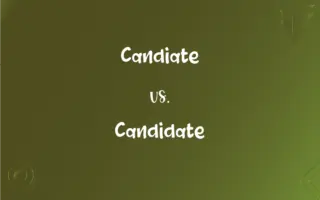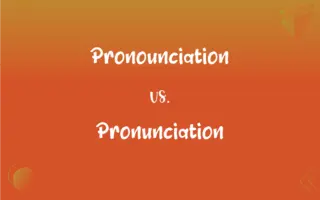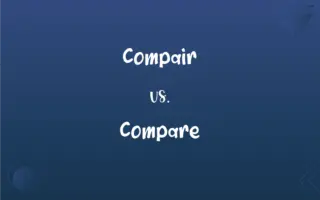Speek vs. Speak: Mastering the Correct Spelling
Edited by Aimie Carlson || By Harlon Moss || Updated on March 8, 2024
"Speek" is incorrect; the correct spelling is "speak." To speak means to communicate or express thoughts in spoken words.
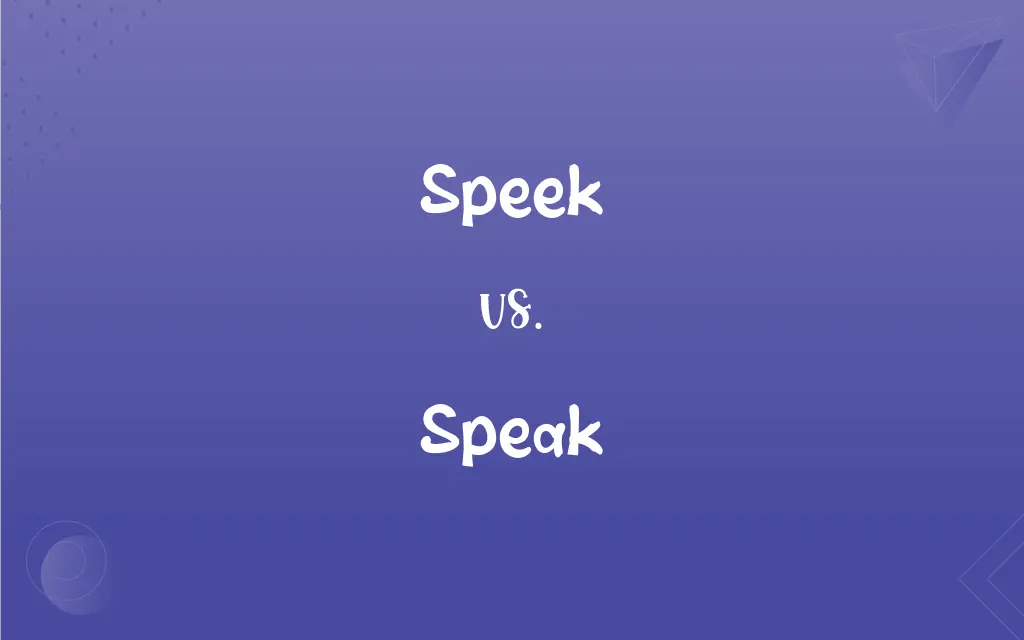
Which is correct: Speek or Speak
How to spell Speak?

Speek is Incorrect

Speak is Correct
ADVERTISEMENT
Key Differences
Visualize a mouth speaking to remember the 'ea' in "speak."
Note that 'e' comes before 'a' in the alphabet, just as in "speak."
"Speak" rhymes with "peak," both sharing the 'ea' spelling.
The 'ea' in "speak" sounds like 'ee' in "see" which is a similar verb.
Compare "speak" with "leak," focusing on the 'ea' spelling.
ADVERTISEMENT
Correct usage of Speak
She will speek about her research findings.
She will speak about her research findings.
I can't wait to hear you speek at the conference.
I can't wait to hear you speak at the conference.
Do you know how to speek Spanish?
Do you know how to speak Spanish?
Can anyone speek louder, please?
Can anyone speak louder, please?
He loves to speek in public.
He loves to speak in public.
Speak Definitions
Speak refers to expressing thoughts or feelings through spoken words.
She will speak at the conference today.
Speak involves conveying information or ideas through speech.
She spoke the truth in the meeting.
To speak is to articulate words verbally.
The child learned to speak at an early age.
To speak a language means to be able to communicate in it.
He can speak three languages fluently.
Speak can mean to give a formal speech or address.
The mayor will speak on the new policy.
To produce words by means of sounds; talk
Can the baby speak yet?.
To express thoughts or feelings to convey information in speech or writing
He spoke of his desire to travel. In her poem she speaks about loss.
To convey information or ideas in text
Their book speaks about adopting children.
Speak Sentences
They speak to each other in French.
To communicate effectively, we must learn to listen as well as speak.
Can you speak more slowly, please? I'm taking notes.
When did you start learning to speak English?
She's been invited to speak at a national conference.
The ability to speak multiple languages is a valuable skill.
It's important to speak clearly when giving a presentation.
He learned to speak three languages fluently.
She can speak Spanish and Italian besides English.
The teacher asked the students to speak up if they had a question.
He's practicing his speech so he can speak more confidently.
Can you speak a bit louder? I'm having trouble hearing you.
I was too shy to speak up in the meeting.
To master a language, one must speak it regularly.
After the accident, he struggled to speak clearly.
They will speak about the importance of conservation.
The guest speaker will speak about career development.
Parents should speak kindly to their children.
We were taught to speak with respect to everyone.
They come from different countries but speak a common language.
It's rude to speak ill of others when they're not present.
Speak Idioms & Phrases
Actions speak louder than words
What someone actually does means more than what they say they will do.
He always promises to do better, but actions speak louder than words.
So to speak
Used to indicate that what you are saying is a particular way of expressing something.
He's not happy with his new assignment, or so to speak.
Speak your mind
To say what you really feel or think.
Don't be afraid to speak your mind during the meeting.
Speak volumes
To provide a lot of information, especially in an indirect way.
The look on her face spoke volumes about her true feelings.
Speak too soon
To make a statement that becomes incorrect because new information is known.
I thought we had fixed the issue, but I spoke too soon.
Speak from the heart
To say what you really feel in a sincere way.
When he apologized, I could tell he was speaking from the heart.
Speak of the devil
The person we were just talking about has appeared.
And here's Sarah now! Speak of the devil.
Not speak a word of
To not know any of a particular language.
I don't speak a word of German, so traveling in Berlin was challenging.
Speak the same language
To have similar ideas, thoughts, or feelings.
We really speak the same language when it comes to business ethics.
Speak for yourself
Used to tell someone that an opinion they have expressed is not shared by you.
We all think it's a bad idea. Speak for yourself! I think it's great.
Speak out of turn
To say something when it is not your place to say it.
I hope I'm not speaking out of turn, but I think we should reconsider our strategy.
Not to speak ill of the dead
To avoid saying negative things about someone who has passed away.
I know he had his flaws, but not to speak ill of the dead.
Let your success speak for itself
To allow your achievements to show your capabilities without needing to boast.
You don't need to brag about your contributions; let your success speak for itself.
Speak up for
To express support for someone or something.
It's important to speak up for those who cannot do so themselves.
To speak nothing but the truth
To say only what is true.
In court, you are sworn to speak nothing but the truth.
Speak directly to the point
To talk about the most important part without wasting time.
Please speak directly to the point so we can address the main issue.
Speak softly and carry a big stick
To negotiate peacefully but also have strength in reserve.
His foreign policy approach was to speak softly and carry a big stick.
To speak freely
To say what you really think without holding back.
You're among friends; feel free to speak freely.
Nothing to speak of
Not much; nothing of importance.
Did it rain yesterday? Nothing to speak of.
FAQs
What is the verb form of speak?
The verb form is "speak."
What is the root word of speak?
The root word is the Old English 'specan.'
Which vowel is used before speak?
The vowel "a" is used before "speak."
What is the pronunciation of speak?
Pronounced as "speek."
Which preposition is used with speak?
Prepositions like "to," "about," and "on" are used with "speak."
Why is it called speak?
It's called "speak" from Old English 'specan,' meaning to talk or converse.
Is speak an abstract noun?
No, it's a verb.
What is the singular form of speak?
Singular form is "speak."
What is the plural form of speak?
It doesn’t have a plural form; it remains "speak."
Is speak a vowel or consonant?
It's a word, not a vowel or consonant.
Is speak a countable noun?
It's not a noun, so it's neither countable nor uncountable.
Is speak a collective noun?
No, it's not a collective noun.
Which conjunction is used with speak?
Conjunctions like "and" or "but" are used.
Which article is used with speak?
Articles like "the" or "a" are used.
Is speak a negative or positive word?
It's neutral, neither inherently negative nor positive.
What is another term for speak?
"Talk" or "articulate."
What is the opposite of speak?
"Silence" or "mute."
Is speak a noun or adjective?
It's a verb.
What part of speech is speak?
It's a verb.
Which determiner is used with speak?
Determiners like "this," "that," "a" are used.
Is the word speak imperative?
It can be used as an imperative (e.g., "Speak now").
How many syllables are in speak?
There is one syllable.
What is a stressed syllable in speak?
The entire word "speak" is stressed.
What is the second form of speak?
The second form is "spoke."
What is the third form of speak?
The third form is "spoken."
How is speak used in a sentence?
"They asked her to speak about her experiences."
Is speak an adverb?
No, it's not an adverb.
Is the speak term a metaphor?
It can be used metaphorically.
How do we divide speak into syllables?
Divided as 'speak.'
What is the first form of speak?
The first form is "speak."
About Author
Written by
Harlon MossHarlon is a seasoned quality moderator and accomplished content writer for Difference Wiki. An alumnus of the prestigious University of California, he earned his degree in Computer Science. Leveraging his academic background, Harlon brings a meticulous and informed perspective to his work, ensuring content accuracy and excellence.
Edited by
Aimie CarlsonAimie Carlson, holding a master's degree in English literature, is a fervent English language enthusiast. She lends her writing talents to Difference Wiki, a prominent website that specializes in comparisons, offering readers insightful analyses that both captivate and inform.
